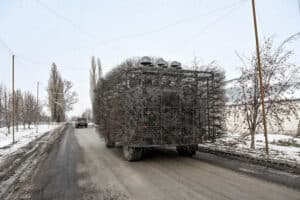They’ve tried to justify the invasion – or “special military operation” as Putin prefers to call it – by finding precedents for interference in the intricately interwoven history of the two countries.

The Russian invasion of Ukraine has generated a lot of what-aboutism and don’t-forgetitis on the part of President Vladimir Putin’s defenders.
They have tried to hide the horror of the past few weeks by drawing dubious parallels with instances of Western perfidy, of which there are many. And they’ve tried to justify the invasion – or “special military operation” as Putin prefers to call it – by finding precedents for interference in the intricately interwoven history of the two countries.
Of course, that is not to deny that Russia has legitimate grievances and fears. Or to claim that Ukraine is blameless and has not goaded the Russian bear, with the West recklessly egging it on. But one does not have to be a professional ethicist to discern basic right from wrong here.
ALSO READ: Five reasons why Ukraine is stalling Russian advance
Neither the fog of war nor the smog of propaganda should obscure what is a legally and morally simple matter. Russia’s invasion was contrary to international law and is being executed with disregard to the Geneva Conventions that protect civilians during conflict.
The invasion is illegal and inhumane. That the invasion is a reprehensible and illegal act doesn’t, however, mean that it was a foolish one. It is still too early to know whether international sanctions and exclusion will speedily force the Russian to compromise. In the meanwhile, for Putin, there are immediate benefits.
The invasion has made it possible for him to cast himself as a latter-day Ivan the Terrible – as the warrior-leader who will restore not only imperial Russia’s lost glory but that of the Soviet Union before it imploded under the weight of its own ideological absurdities.
At a stroke, Putin has boosted his standing with many of the Russian people, erased decades of humiliation in international forums and forced the world’s leaders to treat Russia with caution, if not yet respect.
Perhaps most importantly, the invasion throws into focus how enfeebled the Western democracies have become. It has highlighted the divisions caused by Britain’s departure from the European Union and the uncertain nature of the EU’s response to external threats.
It’s also raised questions over the deterrence quotient of Nato forces. Russia knows, if push comes to shove, the West will back down from armed conflict. The United States, the real power behind any Nato response, is in no better nick.
Afghanistan is fresh in America’s collective memory. Neither has President Joe Biden engendered confidence among his allies with his daft comments. This week, Biden asked rhetorically: “How do we get to the place where Putin decides he’s going to just invade Russia?”
Last week it was: “Putin may circle Kyiv with tanks, but he will never gain the hearts and souls of the Iranian people.”
The comedic response to Russian belligerence has not been confined to the US. In South Africa, we’ve had our own clowns hard at it. International Relations and Cooperation Minister Naledi Pandor reacted immediately and unambiguously to the invasion.
NOW READ: Ukraine rejects Russian humanitarian corridors offer
Russia, the department said, should “immediately withdraw” its forces “in line with the United Nations Charter”. It was downhill from there.
Pandor was reportedly rebuked by President Cyril Ramaphosa and the ANC, backed by Ramaphosa, issued a statement saying that it was not the party’s position to call on Russia to withdraw but rather to push for mediation and negotiation. When it came to a UN vote to condemn Russian aggression, South Africa abstained.
Unfortunately, South Africa’s craven response has nothing to do with genuinely working evenhandedly behind the scenes for peace. It is simply expediency.
If you have any doubt, substitute “Russia invades Ukraine” with “Israel invades Iran”, to inhale the full stench of hypocrisy.
Support Local Journalism
Add The Citizen as a Preferred Source on Google and follow us on Google News to see more of our trusted reporting in Google News and Top Stories.






